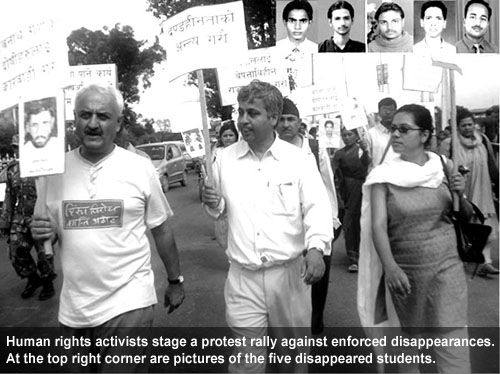|
TABLE OF CONTENTS
Cover
EDITORIAL
- Empowering the Source of our Strength
COVER STORY
- Human Rights Now...
COUNTRY SITUATIONS
- Kashmir: And Disappearances Continue
- Nepal: Supreme Court Judgment...
NEWS FEATURES
- A Week to Remember
- A Memorial Service to the Filipino Nation...
- Healing is Liberating
- “¡Presente!”- A Tribute Concert ...
- Memory, Suffering and Art Counseling
- A Morning or a Dark Night for Human Rights
- Bitter Truth...
PHOTO ESSAY
- Sharpening our Healing Capacities ...
INTERNATIONAL LOBBY
- The Anti-Disappearance Treaty
LETTER OF SYMPATHY
POEM
- For Mothers of the Vanished
|
News Features
Bitter Truth - The Disappearance
of Five Students in Nepal:
Where is Justice?
By: Atty. Kopila Adhikari

The country is in a transitional period trying to address past injustices in order to prevent future abuses and enhance peace. The right to life, freedom of movement, expression, privacy and constitutional remedy is often affected when the local administration is unable to function, the police and judicial system are shattered and government institutions are weak. The government has failed to prevent such criminal activities and bring the perpetrators to justice. It has been unable to identify the challenges of democratization in times of transition, such as how to settle past accounts without derailing or upsetting the transition to democracy. In the context of Nepal, the government has tried to give amnesty to all perpetrators of past human rights violations but the victims, whose family members are still missing, whose whereabouts are still unknown, are of the opinion that they cannot forget the past injustices unless and until justice is dispensed to the victims and appropriate legal action against the culprit is taken.
The issue of involuntarily disappeared persons has featured significantly in the transitional justice initiatives in Nepal. The issue has been described in the documents set to deal with the peace process including the Comprehensive Peace Agreement reached between the government and the Communist Party of Nepal (Maoist) in November 2006. Disclosure of the status of the disappeared persons within 60 days was agreed upon,
inter alia, concrete steps would be taken to address the issue. It has been a long time since the government started talking about the enactment of national legislation on enforced disappearances. A high level commission to deal with the cases is yet to be established. The government is said to be preparing a new draft bill on enforced disappearances; however, it has failed to consult the stakeholders. A landmark decision executed by the Supreme Court of Nepal on enforced disappearances is yet to be implemented.
The case is an example of all cases of disappearances in Nepal. The family members and kin have continuously been fighting and clamoring for justice.
Sanjeev Kumar Karna ( Dipu) along with his friends Durgesh Kumar Labh, Pramod Narayan Mandal, Shailendra Yadav, and Jitendra Jha
 On October 8, 2003, all above mentioned persons reported to their families that they were going for a picnic organized by students. Reportedly, from the picnic, they went to Kataiya Chowri Area of Dhanusha district where they ate. After which, they took a bath in a nearby river. In the meantime, some 20-25 joint security forces comprised of Royal Nepal Army (RNA), Nepal Armed Police and Nepal Police (some were in plainclothes and some in regular uniforms) arrived there on a white colored pick-up van and three blue colored police vans. The security forces immediately arrested 11 persons including Sanjeev Kumar Karna without providing them with any arrest letter. All of them were blindfolded, beaten up with sticks and rifle butts and taken to the then Regional Police Office (now the Zonal Police Office) of Janakpur. Their whereabouts have been unknown since. On October 8, 2003, all above mentioned persons reported to their families that they were going for a picnic organized by students. Reportedly, from the picnic, they went to Kataiya Chowri Area of Dhanusha district where they ate. After which, they took a bath in a nearby river. In the meantime, some 20-25 joint security forces comprised of Royal Nepal Army (RNA), Nepal Armed Police and Nepal Police (some were in plainclothes and some in regular uniforms) arrived there on a white colored pick-up van and three blue colored police vans. The security forces immediately arrested 11 persons including Sanjeev Kumar Karna without providing them with any arrest letter. All of them were blindfolded, beaten up with sticks and rifle butts and taken to the then Regional Police Office (now the Zonal Police Office) of Janakpur. Their whereabouts have been unknown since.
 Sanjeev’s family reported the case to various national and international human rights organizations and mechanisms but to no avail. They visited several barracks but each and every barrack denied the arrest and detention. The National Human Rights Commission has sent a message to the family in line with the response of the different security authorities with whom it corresponded that all of the arrested boys including Sanjeev were killed in a security operation in Janakpur. But, Sanjeev’s father is not yet ready to believe it and is still desperately searching for his son. The family members want to know the whereabouts of their son. If killed, where? When? Who did it? Sanjeev’s family reported the case to various national and international human rights organizations and mechanisms but to no avail. They visited several barracks but each and every barrack denied the arrest and detention. The National Human Rights Commission has sent a message to the family in line with the response of the different security authorities with whom it corresponded that all of the arrested boys including Sanjeev were killed in a security operation in Janakpur. But, Sanjeev’s father is not yet ready to believe it and is still desperately searching for his son. The family members want to know the whereabouts of their son. If killed, where? When? Who did it?
After Mr. Jai Kishor, Sanjeev’s father received the information that his son was arrested by the security forces, he immediately visited a local human rights organization called
Samaj Uthan Kendra and reported the incident to the Director of the Center, Mr. Navaraj Basnet. The Director then contacted Dhanusha District Police Office and Inspector Mohan Sherpa of the District Police Office (DPO), who told him that the arrested boys had been taken to Janakpur Regional Police Office. The father then went to the Regional Police Office, but he was not allowed entry to the office. He did see some blindfolded and handcuffed boys standing in the office premises from outside. He also saw his son Dipu and his friend’s son Durgesh Labh. He, however, could not recognize others.
 The father then returned to Samaj Uthan Kendra and told its director everything that he saw at the Regional Police Office. Then the director again called at the Regional Police Office (RPO). Deputy Superintendent of Police (DSP) Krishna Dutta Tiwari attended the call and conceded that the boys were being held there. He further told the director that Senior Superintendent of Police (SSP) Chuda Bahadur Shrestha would look into their case saying there was nothing to worry about. The father then returned home and again made a phone call to the RPO, but he could not be contacted. He also visited the office of Chief District Officer (CDO) but the CDO could not also be met. The father then returned to Samaj Uthan Kendra and told its director everything that he saw at the Regional Police Office. Then the director again called at the Regional Police Office (RPO). Deputy Superintendent of Police (DSP) Krishna Dutta Tiwari attended the call and conceded that the boys were being held there. He further told the director that Senior Superintendent of Police (SSP) Chuda Bahadur Shrestha would look into their case saying there was nothing to worry about. The father then returned home and again made a phone call to the RPO, but he could not be contacted. He also visited the office of Chief District Officer (CDO) but the CDO could not also be met.
On 11 October 2003, there was a rumor around Janakpur that those arrested boys including Dipu had been killed in Dharapani Barrack and their bodies buried near the Kamalamai River. On the same evening, the worried father visited the Dharapani barrack where he saw his son being taken out of the barrack towards Kamalamai. He was convinced that his son had not been killed and then returned home.
On the next morning, on 12 October 2003, the father went again to the barrack. On the way, he met a person named Binod Singh who owned a teashop nearby the same barrack. He informed the father that he had heard from a person who works inside the barrack that the five persons were killed in the barrack the day before.
On 16 October 2003, Dipu’s mother and Navaraj Basnet of Jana Uthan Kendra again visited Dharapani Barrack where they were told that no one had been killed and all the arrested boys would be returning home soon.
Almost after a month of this, Dipu’s parents somehow managed to talk to SSP Chuda Prasad Shrestha at his home. When the couple asked him about their son, he apparently tried to evade the matter by saying that “only the RNA handles the cases relating to the Maoists.” They could say nothing more and simply returned.
On 1st December 2003, the father wrote a letter to the IGP regarding the whereabouts of his son but his letter was not answered.
The father, Mr. Jai Kishor filed a First Instance Report (FIR) in DPO, Dhanusha on 9 July and other four victims’ families also registered similar FIRs at the same district police office with the legal support of Advocacy Forum. The claimants also requested for the safety of the family members and the security of the place where the five dead bodies were allegedly buried.
After a long discussion, the Superintendent of Police (S.P). of the District Police Office, Dhanusha became ready to register the case saying the case was of a special nature. He listed the case in a special register and also agreed to give security to the suspected place of burial. The place is situated in the north, about a kilometer away from the Mahendra highway near the Kamala River. It is a place surrounded by the Kamala River at the north boundary.
Advocacy Forum sent the case to the UN Working Group on Enforced or Involuntary Disappearances and the case also encouraged Mr. Jai Kishor Labh to attend a meeting of the said body in Geneva on 26 July 2006. In the meeting, he expressed his concern over his son’s case. The members of the Working Group assured him that they would ask the government of Nepal and if any confirmation comes from the government about the death of those five persons, they will refer the case to the UN Special Rapporteur on Extra Judicial Killings.
Mr. Jaya Kishor Labh moved to the Supreme Court on 28 January 2007 seeking the order of Mandamus against the District police office Dhanusha with the legal support of Advocacy Forum. He lodged the FIR before the District Police Office Dhanusha on 9 June 2006 against the SSP Chuda Bahadur Singh and other security personnel on the charge of murder and demanding empirical investigation of the case.
 On 21 August 2007, The Supreme Court ordered Headquarters of Nepal Police to provide a detailed report of the investigation carried out by the Investigating Committee. The Investigating Committee was formed on 17 February 2007 by Headquarters of Nepal Police under the coordination of Deputy Inspector General of Police. The committee, however, is supposed to have been rendered defunct and the police establishment has reportedly replied to the Apex Court that it is forming a new committee vis-à-vis the same. On 21 August 2007, The Supreme Court ordered Headquarters of Nepal Police to provide a detailed report of the investigation carried out by the Investigating Committee. The Investigating Committee was formed on 17 February 2007 by Headquarters of Nepal Police under the coordination of Deputy Inspector General of Police. The committee, however, is supposed to have been rendered defunct and the police establishment has reportedly replied to the Apex Court that it is forming a new committee vis-à-vis the same.
The case bears witness to the fact about the travails and hurdles of Sanjeev’s father regarding his quest for justice. This is what Sanjeev’s father expressed when he was interviewed by Advocacy Forum about his search for justice:
“Scaling the summit of Mount Everest is not a hurdle after a few months of mountaineering training. Arduous it is not to plumb the depths of Marianna Trench after one learns the art of scuba-diving. I devoted my entire life to explore the various facets of justice; but ironically, justice has proved an illusory horizon for me. Whenever I feel that my destination is in front of me, I find myself groping in the gloomy nadir of
impunity.”
 “I wrote over 10,000 letters to different national and international human rights organizations and I am still writing. I made phone calls to NHRC more than 100 times. I wrote numerous letters to political parties of Nepal and Nepal Bar Association. I have received over 10,000 letters from different national and international organizations. I also wrote letters to the King, Prime Minister and Home Ministry. “I wrote over 10,000 letters to different national and international human rights organizations and I am still writing. I made phone calls to NHRC more than 100 times. I wrote numerous letters to political parties of Nepal and Nepal Bar Association. I have received over 10,000 letters from different national and international organizations. I also wrote letters to the King, Prime Minister and Home Ministry.
I wrote six letters to the UN General Secretary Kofi Annan regarding the unknown situation of my son. He replied to four of my letters and expressed his good wishes in my work of searching for my son. He wrote that he has also put my son’s issue forward at the UN meeting. But what I just want is to get my son back, nothing more than that.”

A lawyer by profession, Kopila Adhikari leads the human rights documentation unit of Advocacy Forum, one of Nepal's leading non-governmental organizations who recently joined AFAD. She represents her organization in the AFAD Council.
VOICE May 2008
|